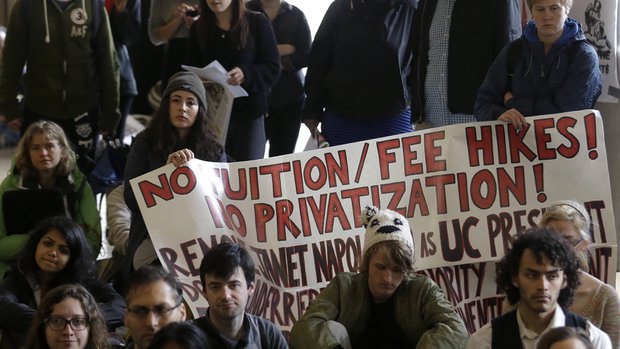Legislators ready to pay UC its ransom

By Steven Greenhut
SACRAMENTO — After University of California regents voted to boost tuition by as much as 5 percent a year unless they receive more state funding, a few observers described the plan as political “blackmail.” Yet California’s legislative leaders this week expressed their willingness to pay the ransom.
They didn’t even ask for much in return for the extra cash — prompting a favorable response from the architect of the “pay up or else” strategy. University of California President Janet Napolitano called the Senate’s proposal “a promising first step.”
Specifically, Senate Democrats on Tuesday unveiled SB 15, which would provide $150 million to University of California and California State University in the first year of the plan. UC and CSU would each receive $50 million “to increase availability of student support services” and $25 million each “to increase course offerings,” according to the proposal.
“If students take 15 units per semester, they will graduate in four years … instead of six years and save about $60,000,” said lead author, Sen. Marty Block of San Diego. “By getting out two years earlier … they free up space in our institution. … You’ve created about 33 percent more capacity in our colleges and that capacity can be filled by the students waiting in line behind them.”
The plan funds additional slots and academic advisers, who will counsel students on how to get out of college more quickly. It provides grants for students who take 30 units a year to give them added incentive. But UC and Cal State students complain the problem isn’t a lack of incentive, rather a lack of sufficient classes.
It’s questionable whether this plan will fix that capacity problem. By keeping prices low and offering additional student aid, the Senate proposal could provide even more demand for classes in an already overloaded system. The plan repeals the planned 11-percent cut to Cal Grants and funds 7,500 new grants for older, “nontraditional” students.
The measure would divert funds from the Middle Class Scholarship program (thus imposing higher costs on students who don’t qualify for low-income grants) and would hike tuition by 17 percent for out-of-state students. The bill’s backers say these students would not be harmed because of overall lower tuition rates.
[Source]: Read more at U-T San Diego


